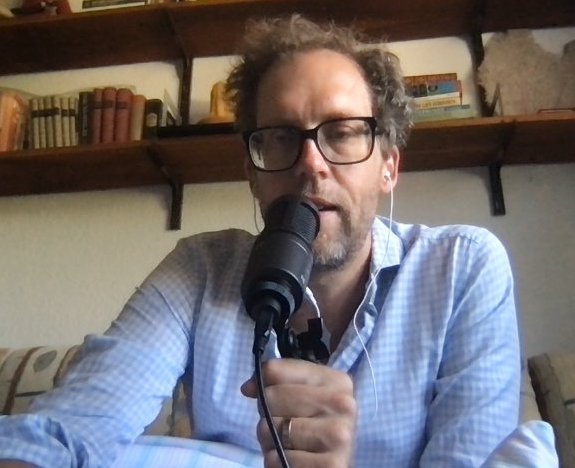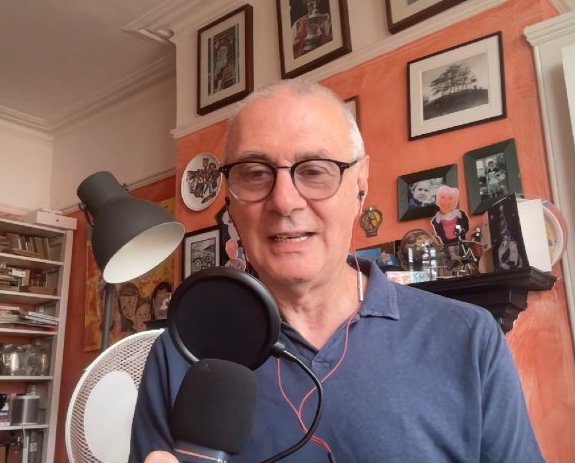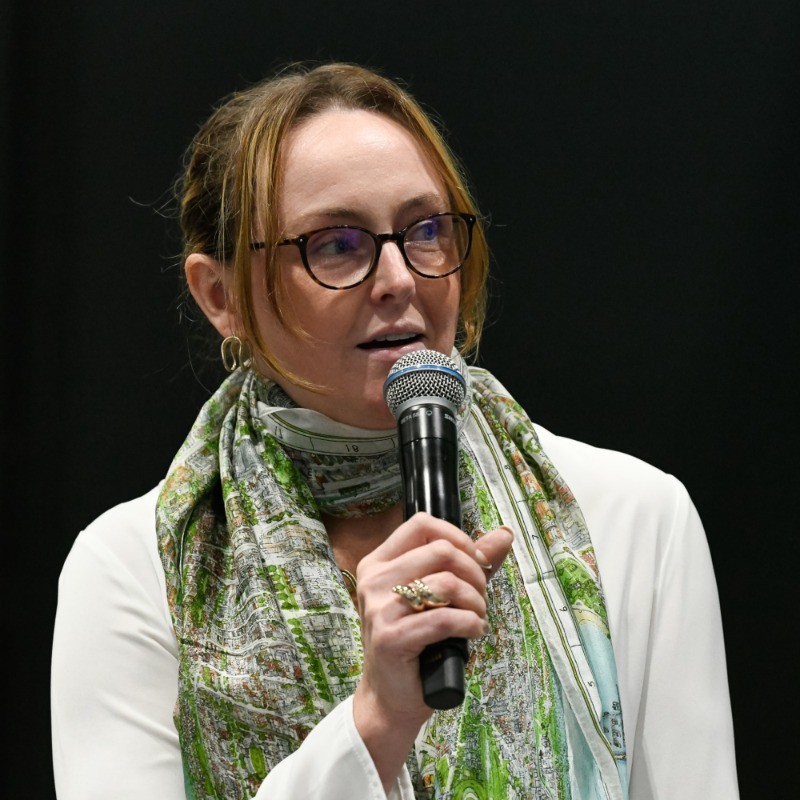Subscribe
Ed and Steve discuss the challenges around privacy and location.
Relevant links:
About the podcast
On the Geomob podcast every week we discuss themes from the geo industry, interview Geomob speakers, and provide regular updates about our own projects.
Popular podcast topics:
The Geomob podcast is hosted by:
Autogenerated Transcript:
Ed 00:01 Welcome to the geomob podcast where we discuss geoinnovation in any and all forms whether for fun or profit. Welcome back everyone with me today again is Steven Feldman. We're here to bring you another episode of the geomob podcast. Stephen, how you doing?
Steven 00:21 I'm doing well. How are you doing?
Ed 00:23 I am doing really well because this week we actually launched the podcast to the live audience and we've had a very positive feedback so it's now out there. People can serve with subscribing and join the podcast and please send us any feedback that you have and anything like that and thank you to everyone for sharing it with others, re-tweeting it, mentioning it. It's great. I'm excited to see so many people coming on the journey with us.
Steven 00:47 Yeah, I mean really the reception's been really surprising. You know, I, my first thoughts were who's kinda listened to us, two guys wittering on about geo, but actually the feedback we've got so far has been really great. So thanks everybody who's listening to us and spread the word. What else you been up to add?
Ed 01:06 Well, I went on a bit of holiday. We went to day's oars, which was in highly recommend, really great. And especially at this time of year cause it wasn't particularly crowded. And uh, we had, you know, one perverse effect of living in Barcelona is that we always have sun here in Barcelona. So actually enjoyed going to kind of a rainy, windy place. And we did a lot of hiking and stuff. And while we were there, we did have one map relevant incident in that we were in one that one of the parks, we were on the Island of San Miguel and in a big park there they have a kind of live scale model of the whole Island and as a map. So that was kind of cool. And that took some pictures and I'm going to send them to you so you can show them on -inaudible-
Steven 01:47 -inaudible- so we both been on holiday cause whilst Britain was being battered by storm after storm and rain and flood donor and I popped off Tamara cash for a week and I relive my youth because I was there nearly 50 years ago and it hasn't changed that much and that was great. We had temperatures in the mid twenties and we also had a MAPI moment. We walked into a gallery and they had an enormous projected display of something called the tabular rod Gerryanna that Roger's map in English, which is a 12th century map by an Egyptian mapmaker called IDRISI and it's one of the earliest world maps that is still in existence. There's obviously earlier ones, but we don't actually have copies of them.
Ed 02:40 How accurate is it? I mean, what, what did they claim to be the world?
Steven 02:45 Well, if you go on my website on -inaudible- dot org you'll see it because I published it knowing that we'd be talking about it for a minute today on the podcast, and you can see a somewhat distorted map of the world, but you can see most of the world. What's really interesting is that he was able to calculate the circumference of the planet to within about 10% of the accurate figure, and that's 900 years ago. I thought that was remarkable.
Ed 03:19 Oh yeah. Okay. I'm looking at it now. So, so what they just assumed everything else was ocean where North and South America are and everything like that. Cause it's right, right. Obviously. Okay, huh. Yeah, it is actually pretty accurate.
Steven 03:35 Yeah. Hey, it's pretty cool. And yeah, it was a great moment and I don't know what's very intelligent and allowed me to stand there drooling for far too long. Anyway, so great holiday. Dave, what are we going to talk about?
Ed 03:48 Well we're going to talk about privacy. Privacy is a topic that comes up again and again around location in the last couple weeks, you know, first of all, last year we had GDPR, which is a kind of a relevant to privacy in general in the digital space but, but we've had a couple of news reports and things that have raised the topic around location based privacy and it's a topic that comes up to nearly in, in various presentations at GM up. So I thought that might be a good topic.
Steven 04:13 Great. Okay. So did you see the BBC Panorama program about
Ed 04:19 Amazon? I did not get, give us a very brief overview.
Steven 04:23 Okay. It was shock horror. Can you imagine how much information Amazon collects about you during the time that your browsing the site and when you're making purchases. You know, and I mean it was like for guys like you and me, it was sort of, well we knew that for, you know, what are you getting excited about? But I think for the broader public who just own conscious of these things, it was absolutely horrifying. The extent of the data that Amazon have collected about you and the fact that they'd been doing this for 10 15 years now means they built up the most incredible database on every individual who uses the Amazon website.
Ed 05:08 Obviously Amazon is not unique there. I mean I think all all the big players are doing this. Then you know, as anyone who runs a website knows it's easy to log things and when user take different actions and you do it in a kind of well-intended way like, you know, show me how many people click on this button and things like that. But, but then the issue is that individual piece of information is of course, you know, trivial or meaningless. But yeah, if you can do it over a long period of time and build up a profile of the person and then combine that with Offworld offline. Things like you know, physically where they are based on where their phone is. Of course you can, each little piece of the jigsaw puzzle can come together, create quite an accurate picture.
Steven 05:45 Yeah, and there's one thing you said, which was almost everybody who runs a website is logging loads of stuff to try and improve the service and all of that. And that's true, but what came out in this Panorama program and know you have to take it with a slight pinch of salt because the people who they're interviewing tend to be people who've left Amazon and possibly have a grudge or an ax to grind. But what they were suggesting was that for over a decade now, it has been a conscious objective in at Amazon to gather data about the users for its own sake, not just for the operation, the website, and that, you know, at the highest levels they've been doing this for a very long -inaudible- time and knowing that they're doing it.
Ed 06:38 I like that
Steven 06:40 deal or not, you know what I mean? But as you said, the more bits of that jigsaw or you know, as you add another piece and another piece, the picture suddenly becomes clearer and clearer.
Ed 06:50 Yeah. Well I think this is what leads to then the eventual backlash in the, in the popular opinion, which then via Amazon or Facebook or whomever, um, which then prompts policymakers to do things like, for example, GDPR, which, you know, all of this is quite new, is as a society we have to learn how to grapple with all this. So, you know, should a company be able to create that kind of profile about me? Should the government legislate to prevent that? You know, obviously then you get into the other issues of like, if I'm should, should the company in country a be able to get a profile about people in country B and you know, who is, so it's complex. I think this'll be a topic that we'll be grappling with for a society, for the generation to come. But I think it's particularly with location, obviously that puts all another spin on things because you can really create quite hyper precise profiles of people. And then when you combine that with other data sets, yeah, you can learn a lot about someone and the, there's a whole industry of course, if these types of data brokers and where you can buy all kinds of datasets and it does,
Steven 08:02 okay. She may be different. I'm not sure about this, but I'm just, I just feel that most of the data that you collect on an Amazon website or, um, is about you. The data that you collect. Um, Facebook is about you and your friends, isn't it, which is slightly different. It's who you know and who you're talking to.
Ed 08:24 But when you add
Steven 08:25 location data in, there's a whole you level to that. Yeah, I mean in a
Ed 08:30 well and then,
Ed 08:32 yeah, true. Well this was the whole issue around something like Google, right, is that if you, you know, you can choose not to use Google services, but almost every single site you go Sue has Google analytics has, you know, you're using an Android phone, you're surfing via Chrome. I mean the, there's really nowhere left to hide and you can understand why, you know, a tried to see technical solutions be it, you know, ad blockers and browsers that add all kinds of privacy features. But also, you know, really try to try to opt out in whatever way and also push political solutions like GDPR. So actually in this way, this might be a point where I can talk a little bit about our approach. You know, at open cage where one of our key sales arguments is that we are not Google and that really resonates with some customers they don't want to be, they don't want to give their data at Google.
Ed 09:23 You know, whether you can have all discussion, whether that makes sense or doesn't make sense. But the reality is there is a segment of the market that is very against sharing more data with Google. And actually as a result we for example, do not use Google analytics on our website. And also on the, on the geomob website, there's no Google analytics. We use a company called fathom, which is very privacy focused. So first of all, just by virtue of not being Google, I think that's probably a good thing. But second of all, this company, it's a, it's a small startup and they, they are very focused on privacy and emphasize the privacy features. And, and we switched, uh, over maybe I think like two years ago because while Google analytics is a great tool, can't present ourselves as being like don't share your data with Google when we have Google analytics on our site. So
Steven 10:12 if you go on the map or your website, I'm afraid we are using Google analytics just because it's so damn simple.
Ed 10:19 Well, it's simple to install. But you know what? Another key motivator for me to switch was it's very, very easy to put Google analytics on your website. Drawing insights from Google analytics gets I at the last few times I looked at it, they make it more and more complicated. You know, there's so many sub venues and so many different things and it makes sense because they are drawing on so many different data sources and exactly, you know, trying to create profiles of people of like, you know, people who came from, they were watching a video on YouTube and then they came to your site and one of the big appeals for me of fathom is that the product itself was just dead simple. And I get the basic information of like how many people came to my site, what countries were they in? But I don't get all the other crap. I mean Google analytics is just always trying to sell you Google ad words and you know, you said install more tracking in many ways. I think be it with analytics or with AdWords. I think Google's biggest competition is themself in that they cannot resist the urge to make their own products more complicated. So,
Steven 11:19 so I'm going to give a shout out now since we're talking about this. For anyone using a WordPress site, which I am, there's a plugin called Jetpack and Jetpack does loads of neat things in helping you to administer your, your WordPress site. But one of those is it gives you really good simple analytics. And since I installed it, I haven't uninstalled Google's tracking but I'm not using it. It's still sitting there in case I want it, but I'm using the jet packs. That's because they're really simple and presented nicely and visible on my mobile phone. If I want to check how the site's going as well as going through the desktop. So quick shout out for the people who make the Jetpack, had him for WordPress,
Ed 12:11 then I would advocate you should go the whole way ma'am. Get rid of Google analytics. But obviously up to you Steve at night and I get that you might want to be sheriff, you know, you might -inaudible- there's some value in having two sources. So if one doesn't work for some reason you can -inaudible-.
Steven 12:24 Yeah, exactly. And also I've only been using Jetpack for, I don't know, a couple of months now, so I'm going to give it a little bit longer and see how it's working before I switch off the other side. Anyway, going back to location privacy cause we wandered off. I was thinking about the fact that if you're tracking people and you're tracking lots of people, you can start to see patterns of behavior. Certainly in a society where freedom of association and political organizing may be forbidden or frowned upon. Actually seeing where you've got a group of people together is a way of understanding that they must be having some kind of a meeting. And you know, I think we sort of ignore this stuff for a long time because it was really cool to be able to track where people were and you know, the endless possibilities for location based advertising. You know, where a Starbucks voucher would pop up on your phone when you were walking close to her, one of their sites or something like that. And you know all that. Where's my buddy stuff and, and we just forgot that what was going on was we were sharing all of this data and we lost control of it in my opinion.
Ed 13:45 Well, I do agree with you that that statement is correct for the majority of the population. There are people who are, who didn't forget. Um, and actually at our next year mob in Munich, which will be at the end of March, March 26th we have a speaker coming from, he was one of the creators of an open source project called own tracks, which is a really cool project. And it's designed so that you can install it both on your own server and on, on your phone. And they have an integration with open cage and they basically, you can track your coordinates and then upload them to your server. And that you can either use that for yourself or you can share it with the people that you want to authorize to share it with. But the whole point is you control the entire data flow and there's no third party, you know, so and there is an active community around this of people who want the cool factor of saying where was I, when was I there, you know, looking back historically but they don't want to share all that data with anyone. So
Steven 14:36 you ever wanted to look back and say where was I? And follow tracks and trails cause I mean I've tried those apps occasionally and I've never ever really wanted to see the outputs.
Ed 14:51 I actually use Foursquare still. I think I'm like the only, the only person I pretty glee in my neighborhood in Barcelona, you know, down on the beach where the tourists go. I can occasionally see that other people are using it. But like in my neighborhood I'm the only person who uses it and my use case I a it is kind of interesting, you know, I have some friends there and it just kind of intrigued to see like when and where my Fredericton, I'd first of all, I don't check in every place I go. I do it only if it's a place I do want to remember or the one other use cases. Every time I go to the gym I check in so that then I can look back and see like, okay, last month, how many times they go to the gym. I know that I obviously there are a hundred dollar apps I could use to do that.
Ed 15:31 But um, but I, you know, I learned the flow in Foursquare and it works fine. So, um, so, so to answer your question, yes, there are times, I mean, I, the other use case I have for Foursquare is, you know, if, like I said, I don't check in every single place I go. But if I go to a restaurant that I like and I don't want to forget it, I'll check in or, you know, so that way I can, I still have a list and it's kind of a, it's not everywhere I go. It's only the places that I really liked and I find that useful. I do find that useful.
Steven 15:59 Okay. So I was reading an article on the New York times website, came out just before Christmas and we'll drop the link into the, into the show notes afterwards and they talk about the headline was 12 million phones one day to set zero privacy and it goes on to talk about the number of app that you've got installed on your phone, which are sharing your location probably without you knowing it and how there are brokers who are gathering this data and combining this data and sharing this data. And it's a big long feature article. Well worth reading. Somewhat sensational but still thought provoking.
Ed 16:47 Yeah, we, you know, we've had some of these companies present at GM up in London. I don't remember. There's a company called hook, H U K that IO. There's also a company that I am a very minor investor and that's called Terra geofence. In these companies. I don't, I mean of course it's like any technology can be used for good or bad. So like I know, I know the case with sergeants very well. They really could not care less about individuals. The data they collect is fully anonymized on the device and by the time they get it, you know, they've, they're built into an SDK built into other apps and you know, it's much more about creating a general picture. So this specific use case with terror dance is then aggregating all that data and being able to sell that to mobile phone operators so that they can see where's the, where's the network working well and where is it not, which, you know, that's a completely legitimate use case in my opinion. And it has it really, the last thing they they want to do is violate anyone's privacy. So, okay.
Steven 17:45 So I want to challenge that.
Ed 17:47 Okay. I want to challenge that sat
Steven 17:48 for a moment day have the best of motives and they've got a valid business case and all of that. But you said that they trust fully anonymized.
Ed 18:00 Yes.
Steven 18:01 Right. I would question that.
Ed 18:06 Well,
Steven 18:07 the big problem we, we think that by deleting personal identifiers, phone identifiers, whatever, we have anonymized a data FET. And yet we know that smart people are able two de anonymize that data by combining it with other data.
Ed 18:31 Yeah. So I guess the issue there would be is how can you take steps so that it cannot a technically cannot be combined with other data. You know, I guess that's a,
Steven 18:41 I don't think you can,
Ed 18:43 well I can tell you what we do at open cage. So, so we do have customers who are very concerned about privacy and we created an optional parameter that you can send that says, you know, under open kids should not log this data and we obey that perimeter. You know obviously people, people need to send us coordinates or whatever. First of all we tell people, please send us coordinates but please do not send us any personal identifiers that go with that because frankly they just make our life harder in terms of geocoding but and then the query comes in, we respond to and in our log line we have no record of what the query was. And in some ways it makes our life harder. Cause then sometimes customers will say, Oh, I searched for this and I didn't, you know, why didn't I find it? And I'll be like, look, I can't, I can't see what you actually search for because you're using less private privacy settings. I have no technically no ability to see it.
Steven 19:32 Okay. And that certainly is sounds like it would be completely anonymous, but if you've got a device broadcasting, if you are going to somehow identify all of the location pings from that device that's coming from one device, then it can't be, it's not completely anonymized.
Ed 19:55 Yeah, I think there are steps you could take there. As you could say for a short window of time you could say, you know for this hour, give it, give it a time based identifier and you say like, you know, and then that expires and when that same device sends data and hour later it as a different identifier. So I think there are steps you can take. You are correct. You know, all systems at some point are hackable or whatever. And fundamentally we have to trust the word of the company. And of course that should be backed up with kind of legislation. Right. You know, which like GDPR or things like that. But yeah, I mean there's no simple solution.
Steven 20:33 I also read this week you're getting my reading list of the week and article by our good friend ed pass, which he called the ethics of location sharing. And I really recommend this article to everybody cause it's very thought provoking. There was an incident in Australia where a backpacker went missing and nobody could find him. And uh, and the question that came up was that when they were searching for this backpacker was what was his phone saying? And the short summary is that his family had his passwords or something and they, they were able to connect to his mobile phone logs or whatever and they were able to, to follow his track. And unfortunately it didn't raise, it hasn't resulted in, in him being found. And I think as we speak, he's still missing. But question it prompted was should there be circumstances where the phone operator, the operating system, something should allow emergency services or somebody else to access the location data being emitted by your mobile device? Or are we going to just rely on parents or friends being able to hack it because they know your password?
Ed 22:05 Well, yeah, I mean there's a question I think society needs to solve. That was a well-written piece. I read it as well and it does raise good questions. Then there's the issue of what can we do technically and then there's the question of what should we do as a society because the issue was that this backpacker, I mean he wasn't child, he's an adult, so should his family have the right to get that data? Is that a violation of his privacy or not? Actually, we had a presentation I think last October here in Barcelona from a company called Custodio and their entire service is kind of parental locking of phones and giving you the option to kind of control your children's phones amongst other things. Also things like location tracking and we had a very, very good presentation there. And he talked about all the challenges of that a on the one hand from a technical side, but much more from a, from a social side of like, should the parent be able to see where their teenager is at all times or should you just have kind of gray zones where you say, you know, send me alert if the kid does not get to school at a by a certain time or, or if the kid leaves the neighborhood or if the, you know, and I don't think there's a right answer.
Ed 23:10 It's more, you know, as individuals and as a society we need to decide.
Steven 23:15 I think we've got a big problem in the complexity of those kinds of decisions. And how you, you set those things up. I mean, as far as I know, I've got location sharing on in some way on my phone and I think we've got a family group and we share locations as a family. They're all, all my kids are, I don't know. Um, it's not creepy, but I'm not sure what we're, and I can't remember, but when I last checked the settings and change the settings savvy yet, you know, I mean for most people they are operating on the default settings in the same way that most people, me included have got to the stage where so pissed off with being bombarded with accepting cookies on every website that we go to that we just automatically accept the cookies without ever looking at what those cookies are doing. And I think the same problem, you know, with location, you know, you get told this Apple work better if you switch locations sharing on, so you switch it on, then you forget that you've got switched on. I mean, I don't think providing more and more settings are more and more control for the user isn't necessarily helpful for anybody, but the privacy, obsess and very, very technical work. I completely agree with you. People don't
Ed 24:46 grasp exactly what's happening and most people don't have the time and energy to figure it out. And, but I think this also opens a business opportunity for companies like Custodio or actually, I don't know if you saw, but a couple of weeks ago it was announced a fairly large fundraising of a company in the U S called radar that IO, what they do is they help companies, particularly for marketing, do geo fencing. And they, you know, they have all kinds of cool use cases where you could do that, but it does open up privacy issues. And you could, I saw in their fundraising, I've been tracking this company for a while and they, you can tell them they're fundraising, they're trying to move their positioning and how they announced it to be much more privacy focused. And so I think the good news is through things like the BBC it show you talked about, or this New York times article or GDPR, the introduction of GDPR, we're seeing more and more as a society, people are realizing we need to grapple with these issues.
Ed 25:38 That doesn't mean it's gotta be simple and easy. I mean, I can tell you it affected us quite a bit actually because open cage, when we started, we were a UK company because, you know, originally I used to live in London and that was where we got started and you know, last year we moved the company to Germany because of GDPR, because more and more of our customers, our EU customers were saying, look, I, you know, GDPR is here, you're a UK company, Brexit is happening. Are we going to be able to send you our data anymore? We don't have clarity and thing is with our, my existing customers, I could of course have a dialogue with them, but this coming up so much that I was like, well, how many customers are we going to lose who never even talked with us? Because they just say, Oh, you're not in the EU. I can't send you my data. So yeah, I think entrepreneurs, companies are going to have to grapple with the situ of privacy more and more. It's going to become more important. I think probably we'll see some overreactions, but I think there's a big opportunity there for people who figure out out of complexity. If you can create simplicity in a way that people can understand and use and are happy with, that's a great opportunity
Steven 26:41 and I think the validator of that is the current advertising campaigns that Apple are running. I don't know whether you've seen them.
Ed 26:50 No. Wait, what are they? What do they look good?
Steven 26:53 They're running privacy centric advertising campaigns at the moment. I think particularly for the iPhone, they're really bringing privacy as a major feature in the promotion of their products. That's partly because they don't have an advertising based model. They don't sell your data. They are in a place where they can set themselves apart from the -inaudible-, from Google, Facebook, and Amazon because they only use your data in delivering services to you. They don't do anything else with it, but they've made it a major feature in an advertising campaign, which is interesting. They obviously see privacy as a growing issue and one where they've gotten edge.
Ed 27:40 I think this will become the norm for companies more and more in in Germany, which was another market. Obviously I'm very familiar with. It already is a major topic in some cases, in my opinion, two extremely and too much of an overreaction. But, but I think Apple is a company that's very well placed there out of complexity, making simplicity. You know, I remember when the iPod came out and before that there had been tons of MP3 players with all kinds of different features and it was, it was complicated of like, how do I get the MP3 is do I go to Napster or where do I get it? And then they just came out with a device with one button with simple to use software and all of a sudden you could listen to your music and it was in an illegal way and you know, the problem was solved. So I think that moment still needs to come on the, uh, the privacy side. And you know, maybe we're so long way away from that, but I think smart entrepreneurs should, should be thinking about this.
Steven 28:30 Yeah. But I think I'm going to differ from you there. I think the big privacy concerns come with the big internet giants and they are going to have to take a lead, change their behavior and in bed privacy in a different way into their services. You know, I mean theoretically I think you can, you've got incredibly granular privacy settings within your Facebook account if you've got one still. But for most people it's impossible to work out what those settings but doing and what the exceptions are and and all of that. And I think the big tech companies you talked about trust before, they're going to have to work very hard to regain our trust on what they're doing with that data because we can't be expected to understand all the data that they hold on us, how they've gathered it, what they do with it. We actually need them to take lead.
Ed 29:33 Yeah. The question is, will they have the foresight to do that themselves or will it be only at the prompting because of government legislation and things like that. So, so
Steven 29:42 I reckon we've been talking for too long because I seem to recall somebody telling us that 30 minutes was a good time and we're at 35 minutes now, so we're not going to solve privacy today, but no, but maybe we can get ed pass to come on onto the podcast and chat to us about the Google perspective on some of this stuff.
Ed 30:04 Yes, that would be very good. Let's, let's try to organize that for a future future interview. Okay. Um, all right, let's wrap it up then. Thanks very much Stephen, and uh, thank you, all of our listeners. We'll see you next time.
Ed 30:19 Thanks everyone for joining us today and listening to the geomob podcast. Hopefully you've enjoyed the discussion. Please don't hesitate if you have any feedback for us or any suggestions for topics that we should cover in the future. You can get the show notes over on the website, which [email protected] while you're there, if you're not yet on the mailing list, please do get on the mailing list where we once a month send out an email announcing future events, summarizing past events and just generally sharing events that you may find of interest. You can also of course follow us on Twitter where our handle is geomob. You can follow Steven at Steven Veltman. You can follow me fry Fogel, you can check out Mappery at -inaudible- dot work and of course if you need any geocoding, please check out my service, which is open cage data.com. We look forward to you joining us again at a future episode or end of course seeing you at a future geomob event. Hope to see you there soon. Bye.







